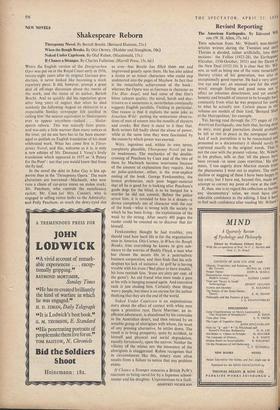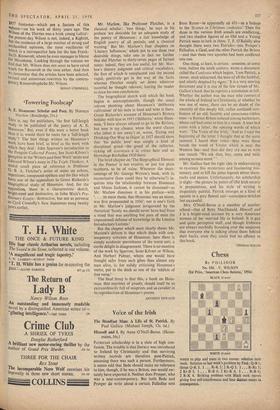Revised Reporting
The American Earthquake. By Edmund son. (W. H. Allen, 37s. 6d.)
THIS selection from Mr. Wilson's non-literary articles written during the Twenties and earl) Thirties is divided, rather artificially, into three sections : the Follies (1923-28), the Earthquale! (October, 1930-October, 1931) and the Dawn of the New Deal (1932-34). It is clear that Mr. son, as well as being one of the most remarkable literary critics of his- generation, was also t1 exceptionally good reporter. He had a very atteg tive eye and ear; an unusual care for the exact word; enough feeling and good sense not t4 affect an inhuman detachment, and yet enough honesty and breadth of interest to be brought back constantly from what he was prepared for seeigl to what he actually saw. Certain pieces in thls volume are models of their kind, 'Bernard Shay at the Metropolitan,' for example. Yet, having read through the 575 pages of Tlii American Earthquake, one feels that, having doge
its duty, even good journalism should probablybe left to rest in peace in the newspaper roolg
And if such journalism is to be resuscitated and presented as a documentary it should surely be reprinted exactly in the original words. That V not the case with the present volume. Mr. Wilson in his preface, tells us that 'all the pieces have been revised—in some cases rewritten.' He else states, 'I too eagerly drew Marxist morals from the phenomena I went out to explore. The mai shallow or nagging of these I have been happY ic lop away, but I have not, beyond this, made go) attempt to correct my point of view at the tittle. If, then, one is to regard the collection as havingany 'documentary' value, we must have conl. siderable confidence in the editing. I find it hart to feel such confidence after reading Mr. Wilson 1957 footnotes—which are a feature of this Volume—on his work of thirty years ago. The Wilson of the Thirties was a brisk young Leftist: the present-day Wilson is not, indeed, a Rightist, but the residence of a large number of strong and unclassified opinions, the most vociferous of Which is a retrospective hate for the late Frank- lin D. Roosevelt, whom he even manages to blame for Hiroshima. Looking through the volume we find that Mr. Wilson does not seem to have cared oluch for Roosevelt at the time either. And then we remember that the articles have been selected, revised and sometimes rewritten by the contem- porary Rooseveltophobe Mr. Wilson.
DONAT O'DONNELL















































 Previous page
Previous page